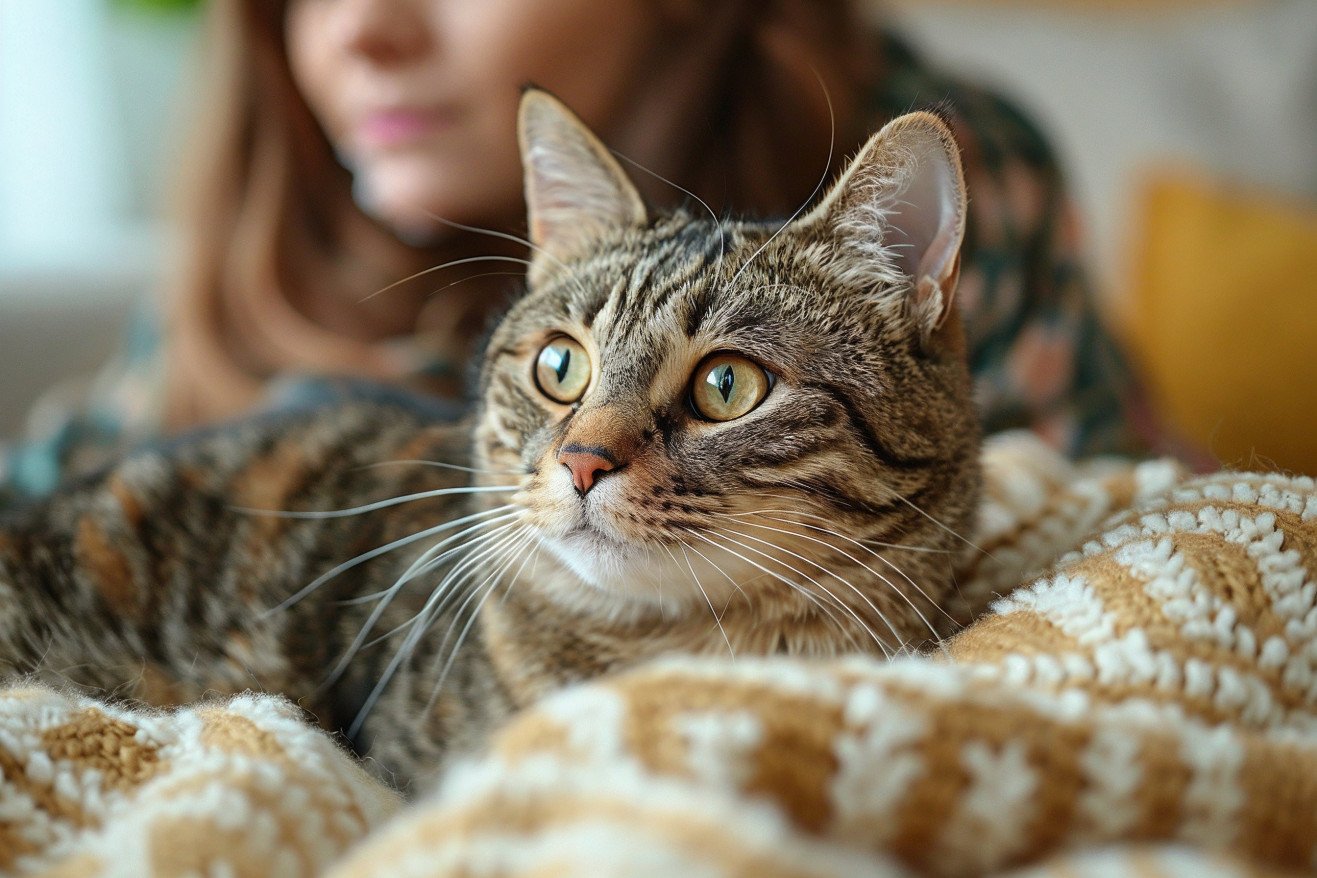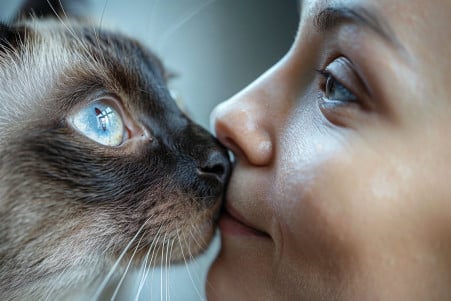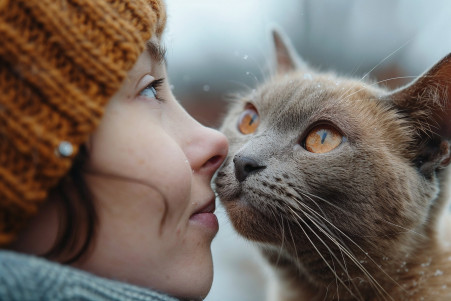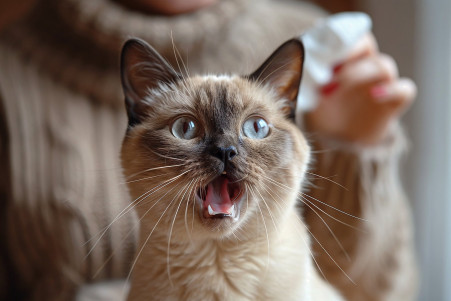Can Cats Sense When You're Sick? An Investigation of Their Perceptive Powers
25 March 2024 • Updated 25 March 2024

While our cats may not have the ability to understand human illness, there is a wealth of evidence that shows that cats can sense changes in their human's health and behavior when they're sick. This is due in part to their keen sense of smell, which can pick up on changes in body odor that are associated with illness, fever, or hormonal changes. Cats are also very in-tune with their humans' schedules, energy levels, and even the more obvious signs of illness, like coughing or lethargy, which can help them understand when something is wrong.
This article will explore a variety of scientific studies conducted by animal behaviorists, biochemists, and veterinarians that demonstrate how cats can detect human sickness through changes in scent, body language, and disruptions to their daily routines. By doing so, we can learn more about the bond between cats and their humans and gain a better understanding of just how much our cats can tell about our health.
Can cats sense when their owners are sick?
How Cats Communicate Illness Detection Through Body Language
If a cat feels that something is wrong with their human, they will often show it through changes in their body language and behavior. According to Elite Veterinary Care, physical signs that a cat may be trying to communicate that their owner is sick include a stiff or floppy body, a hunched back, an unsteady walk, and changes in the position of their tail. Their ears may also be pinned back, their pupils may be dilated, and they may squint or blink more than usual.
In addition to these physical signs, cats will often change their behavior if they believe that their owner is unwell. For example, they may become more affectionate or withdraw from their human, seeking out their human for comfort or avoiding them. Changes in their sleep patterns, grooming habits, and vocalizations may also indicate that they have detected a change in their owner's health. In fact, according to the VCA Animal Hospitals website, any change in a cat's behavior or habits is a potential sign that they have detected an issue.
It's important for cat owners to be able to recognize these nonverbal signs because cats can't tell them directly if they think something is wrong. However, by paying close attention to their pet's behavior and habits, owners can learn to recognize when a change in their behavior may be a sign that they have detected an underlying issue. This can help them understand the biological processes that enable cats to detect changes in their owner's health.
How Cats Can Smell Sickness
Cats' ability to smell sickness in their human companions is due to their powerful sense of smell. As the PMC study points out, domestic cats have an excellent sense of smell and an olfactory bulb and mucosa that is almost twice as large as that of humans, which makes them sensitive to even the smallest chemical changes in the body, including those caused by cancer or hormonal imbalances, according to Floppycats.
In addition to their sense of smell, cats have also shown an ability to pick up on and react to emotional cues from their human caregivers, as shown in the PMC study on emotion recognition in cats, which means they may be able to pick up on changes in their owners' moods and behaviors that are associated with illness and therefore smell sickness.
Finally, evolutionary and genetic factors may play a role in why some cat breeds are better at smelling sickness than others. As the Floppycats article notes, survival instincts and senses that have been honed over thousands of years of living with humans may make some cats more sensitive to changes in their owners' health and well-being.
Potential Medical Diagnostic and Disease Detection Uses
Cats' ability to smell cancer and other diseases on a person's breath or urine could potentially be used in medical settings for early diagnosis. As Love my catz explains, cats' highly sensitive sense of smell enables them to detect hormonal changes and chemical differences in the human body that are linked to a variety of medical conditions.
In fact, scientists have studied the potential of using the Toxoplasma gondii parasite that cats carry to develop a vaccine for particularly aggressive forms of cancer, according to Medical News Today. While this research is still in its early stages, the possibility of training cats to detect medical conditions, much like dogs that can sniff out diseases, is an active area of research.
Anecdotal evidence, such as the story of the cat that detected its owner's breast cancer, demonstrates the diagnostic potential of these intuitive animals. As Catster observes, while training cats to perform these specialized tasks is difficult, their ability to detect illness through scent, physical symptoms, and changes in behavior is a valuable skill that deserves more scientific attention.
Can Cats Be Trained as Medical Alert or Assistance Animals?
While training cats to detect specific medical conditions is still a work in progress, experts agree that cats can be trained to perform a variety of tasks, including alerting their owners to potential health issues. Healthy Paws Pet Insurance points out that the idea that cats can't be trained is a myth, and many cats can be trained using the right methods.
Positive reinforcement, which is the training method most often used with dogs, may be one way to train cats, according to Animal Med Direct. However, cats may need to be trained from a young age and have the right personality to be successful in medical alert roles. Meanwhile, CBS Philadelphia points out that both dogs and cats have a keen sense of smell that enables them to detect chemical changes in the body that are associated with various illnesses.
More research is necessary to develop training programs and determine whether cats can be used as medical alert or assistance animals. However, as Daily Paws explains, cats' strong sense of smell and close relationships with their owners mean that they may have potential in this area, even if it will take some work to realize it.
How Cats Respond to Their Owners' Illness
Cats' keen senses and powers of observation mean they can detect even the most subtle changes in their owners' well-being. When a cat detects that their owner is sick, they may respond with a range of behaviors that show concern and affection.
As the FVEAP article explains, common responses to a sick owner include increased clinginess and anxiety, which leads to the cat seeking more physical contact and reassurance. The article also points out that cats may lick their sick owners more often, which could be their way of showing concern and affection.
Meanwhile, as the Pets Stack Exchange discussion notes, changes in a cat's sleeping behavior, such as sleeping closer to or even on top of their sick owner, are a well-documented way that cats respond to their owners' illness. In addition, the Spruce Pets article explains that increased vocalization, purring, or other attention-seeking behaviors are also signs that a cat may have detected their owner's illness.
These changes in behavior show the strength of the bond between cats and their owners and the special way that cats can sense and respond to their owners' well-being. This knowledge can help us better understand the intricate relationship between our cats and their human family members.
Conclusion: Understanding the Feline-Human Bond and Illness Perception
Cats have a special bond with their human owners, which may help them detect changes in their owner's health and well-being. A cat's ability to detect illness in their owner may be due to a combination of factors, including their long history of domestication and cohabitation with humans and their genetic relationship with humans.
Cats' ability to detect illness in their owners may be an innate survival skill that has been honed over generations. More research is needed to fully understand the feline-human bond and how it shapes cats' ability to detect when their owners are sick.


